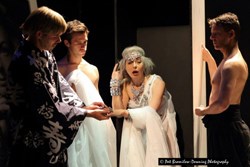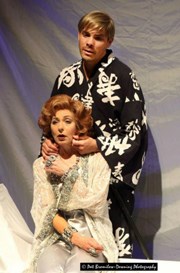






For Williams, a masterful and consummate playwright, death has always been a morbidly fascinating and sometimes humorous encounter that became the subject of plays like Orpheus Descending, Suddenly Last Summer, A Streetcar Named Desire and The Milk Train Doesn't Stop Here Anymore.
In real life, Williams' personal encounter with death was the sad loss of a great love, the demise of his sister and mother, and eventually his own mysterious death after many "near death" traumas. Williams' euphoric and austere attitude towards mortal demise resulted in the creation of celebrated tragic goddesses, who desperately wanted to sip from the fountain of youth: in particularly The Roman Spring of Mrs Stone and Sweet Bird of Youth, older and mature women sprung to life and dominated the young studly warriors who worshipped at their altar. In The Milk Train Doesn't Stop Here Anymore death is unmasked in all its glory.
Flora "Sissy" Goforth is another great tragic heroine whose shocking veracity turns her into a devil who feels ugly, a "bitch who is allergic to other bitches", a "dying monster" who yearns to die with dignity. These fascinating fragile female characters were grounded in Williams' own reality and persona, and through the eyes of a wounded woman we are staring at death and obsessive love from a personal and intimate familiarity. It's this blend of surreal fantasy and extreme realism that sparks an internal and external conflict within all the characters.
Any Williams' play is ideal for visionary Fred Abrahamse; the dramaturge's overt theatrically, dramatic intensity and lyrical exposition fit Abrahamse like a glove; he masterfully allows the play to come to life through his sensible direction and delicate artistic visual flair, enhanced and complemented by Marcel Meyer's arresting costume designs and Charl-Johan Lingerfelder's imposing and haunting music score, which powerfully amplifies the emotional impact. Abrahamse allows the fantasy to explode with vibrant vivacity and deals sensitively with intimate encounters; performers roam freely within the constrictions of what the play demands and the imaginative interpretation.

From the moment you enter the theatre, the audience is immersed in a thrilling mystery of sound and image; this calm before the storm sets a tranquil serenity that perfectly sets the mood for the impending heartbreak; the statuesque setting designed and lit by Abrahamse, sets in action a meditative eroticism and ritualistic fervour.
The abstract realism launches the dramatic Mrs Goforth into action and from the moment the miraculous and marvellous Jennifer Steyn appears in the meticulous incarnation of a tormented and demented demon from heaven, her performance and deliverance captures our full attention and maintains its momentum throughout the play. Steyn perfectly captures the essence of a woman who desperately needs to escape from her imprisoned past and through her larger-than-life performance, we empathise with her masquerade; fleeing her terminal illness and quest for a healthy existence and mental stability, nothing will stop her marauding onslaught. Her presence and significance are amplified through a megaphone; the introspective privacy of her thoughts are broadcast to the world, she wants us to know and delights in tormenting those around her with her articulate torment. Mrs Goforth desperately needs a lover in a world where the "dead are dead and the living are living", and the truth behind the gossip is a pack of lies.
It's particularly here where Williams' real-life encounter and lifelong friendship and animosity with Truman Capote surfaces when the playwright refers to the "true and false Capote".
Mrs Goforth's alien existence on her spaceship perched on a mountaintop is beautifully contrasted by the invasion of a rugged intruder, with Marcel Meyer adding emotional depth and sensitivity to Flanders, symbolically climbing the mountain to reach his pot of gold. It's an intriguing character, a sexy Angel of Death and Trojan Horse trespasser whose notebook is filled with the names of dead older women and whose contradictory life as poet, ski instructor and guru offers a fascinating contrast to the warped mind of a demented woman.
The contrast between the two characters inspires heartfelt conflict, with Mrs Goforth averse to the moral blackmail of freeloaders and will only go forth when she is ready, with Flanders trying his best to console her and making her aware that her "suffering from loneliness" needs agreeable companionship and not just friendship. Their relationship is impeded by the intrusion of outsiders; a militant presence that guards her security and wild rival that fuels her anxiety, with Nicholas Dallas delivering a great show in this role, particularly his performance as the grotesque and campy Cruella de Vil/ Burtonesque Witcg of Capri.
As Blackie, Roelof Storm commands attention with his sensitive and alluring presence that casts a perceptive but perceiving shadow over their lives. It is interesting that in The Milk Train Doesn't Stop Here Anymore, Williams' solution to loneliness is to "rely on strangers", and in Streetcar Named Desire, he emphasises its vital importance by reiterating that we should always "depend on the kindness of strangers".
In The Milk Train Doesn't Stop Here Anymore, filled with classic romanticism and nostalgia, "everything signifies something" as we explore the demented memories of a faded beauty whose legendary existence cannot last for ever.
The rich exposition explodes into flights of fantasy, cultures and styles clash and imprisoned characters escape mercifully into a parallel universe, ruled by fantasy and an exaggerated extreme reality that reflects Mrs Goforth's mindscape.

The startling transformation the play takes us through is intriguing; it's bookended structure of narrators launching us into a story that evolves from fascination and intrigue to exposed disclosure, offers a rare triple gratification: the story journeys inward, the characters mutate out of their cocoons and the audience matures from mysterious bystanders to active emotional participants.
When Mrs Goforth spews "what they need or think still want", we know and fully understand; it's a heart-breaking declaration that seals her fate and takes us to a mind-blowing conclusion. The play importantly states that "all live is a memory" and serves as a poignant reminder that our recollection of memories, just as Mrs Gosforth's ominous husbands, illustrious affairs and financially rewarding marriages, need to be valued and never wasted.
We have to face "the meaning of life" (and death), and not treat it as an insignificant joke, and we are reminded that "death is only one moment, but life has many moments", and that the milk train does occasionally halt at everyone's "crazy station". "One person's sense of reality is another person's sense of madness", and this is what makes Williams and plays like The Milk Train Doesn't Stop Here Anymore important in our lives, challenging us to boldly play the "truth game" and realise that our spirit has to live in a body that is cared for and loved dearly.
It is fully understandable why Williams' significantly prophetic The Milk Train Doesn't Stop Here Anymore traumatised audiences when it was first staged in 1962; today it is a play that it vital to the lifeblood of our humanity, aptly reflecting fabricated lives and artificial morals in desperate need of a spiritual makeover.
Theatre truly comes alive once its inner life is perfectly realised; with The Milk Train Doesn't Stop Here Anymore the experience of theatre and its commanding emotional impact results in an evening of proudly South African theatre at its most passionate.
The Milk Train Doesn't Stop Here Anymore run until 20 October at Artscape ARENA. Ticket price: R70 - R120. Booking: Computicket or Artscape-Dial-A-Seat on 021 421 7695.
Tennessee Williams' classic drama The Milk Train Doesn't Stop Here Anymore comes to Artscape directly from the 8th Provincetown Tennessee Williams Theatre Festival in the US. Tennessee Williams incorporated elements of classical Japanese theatre into the structure of Milk Train because he felt that the play would "come off better the further it is removed from conventional theatre". This has afforded multiple-award winning design team - Fred Abrahamse (set and lighting), Marcel Meyer (costumes) and composer Charl-Johan Lingenfelder the chance to create a visually striking production of this dense and poetic play.
Read more at http://www.writingstudio.co.za/page1746.html
